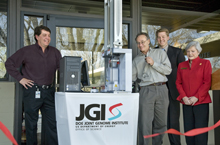 |

Energy Institute Focuses
On Biofuel From Plants
Harnessing the sun through solar panels is a great idea in principle, but harvesting stored solar energy from plants is a more promising and economical approach to help meet global energy needs, a Berkeley Lab biosciences expert said at a UC Berkeley lecture Wednesday. Chris Somerville, director of the new Energy Biosciences Institute, said the potential of photovoltaic technology for meeting the world's rapidly growing energy needs hasn't panned out in the 87 years since Einstein won the Nobel Prize for discovering the photoelectric effect. A better bet is to lay microscopic siege to the Earth's abundant plant cells, break down their walls and extract their sugars to produce alcohol for fuel. Full story.
 |
 |
|
 |
Lowering the Last
ATLAS Component
Today the final piece of the giant ATLAS experiment was lowered 300 feet into the tunnel housing the Large Hadron Collider (LHC) at CERN, a major landmark in preparation for LHC's start-up this summer. The final ATLAS component is one of two "small wheels," each 30 feet in diameter and weighing 100 tons, small only by comparison to the rest of the five-story detector. More than 500 of the 1,900 ATLAS collaborators are U.S. scientists supported by DOE and NSF, including Berkeley Lab physicists and engineers who have built many key ATLAS components. Read the press release here, and more about ATLAS here.
 |
 |
|
 |
Research Misconduct
Policy has Been Revised
Effective Feb. 28, the Laboratory has revised its policy on investigating allegations of research misconduct. This action was taken in order to establish uniform procedures regardless of funding source and to ensure compliance with federal regulations. The major change is in the level of detail and assignment of roles and responsibilities. The policy can be found here.
 |
 |
|
 |
 |

|
|
 |
|
| From left, JGI's Ray Turner and Eddy Rubin, Congresswoman Tausher rep Erik Ridley, and Walnut Creek council member Susan McNulty Rainey |
|
JGI Unveils Walnut
Creek Expansion
After helping crack the human genetic code, the Joint Genome Institute has moved on to work that could lead to new energy sources and environmental cleanup using microorganisms. The DOE facility has increased its staff and extended its lease in the Shadelands Business Park in Walnut Creek. It unveiled an 18,000-square-foot expansion Wednesday, highlighted by a ribbon cutting performed by a robot. The Genome Institute's new space includes a research lab and some of the most ergonomically advanced furniture in the world. The facility last year won an award for creating a work environment that is adaptable to employees' needs. Full story.

Utilities Still in Dark
Over Florida Blackout
|
|
|
|
 |
 |
|
|
| Eto |
|
|
|
Floridians have power, but not answers to how a small equipment malfunction in South Florida triggered a massive blackout that left millions of people in the dark Tuesday afternoon. Florida's outage spurred new concerns about the vulnerability of the electric grid. Experts from around the country pointed out the system's fragility due to aging equipment, breakneck growth and ever-evolving cyber threats. Power outages cost the nation about $80 billion a year, said Joe Eto, with Berkeley Lab’s Environmental Energy Technologies Division. Full story.
 |
 |
|
 |
Staff Can Take Survey
On Procurement, Property
Employees are invited to share their comments on the quality of service provided by the Lab’s Procurement and Property Department by taking a brief survey. The comments will be used to improve customer satisfaction. Go here to access the survey.
 |
 |
|

